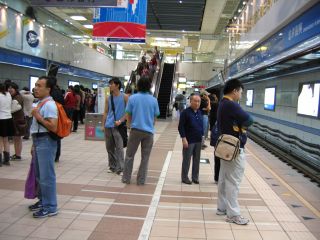Variations of a ‘Hong Kong model’, such as the one offered by China’s president Xi, have no appeal in Taiwan whatsoever. This has been shown in polls since the middle of the 1990s. Moreover, the fight for democracy in Hong Kong illustrates what the Taiwanese have known all along, that Taiwan is their home, and they have no desire to unite with China. Taiwan Corner’s position has always been that the Taiwanese people must be allowed to determine their own future. Now, it is time to open our doors even wider to Taiwan.
Variations of a ‘Hong Kong model’, such as the one offered by China’s president Xi, have no appeal in Taiwan whatsoever. This has been shown in polls since the middle of the 1990s. Moreover, the fight for democracy in Hong Kong illustrates what the Taiwanese have known all along, that Taiwan is their home, and they have no desire to unite with China. Taiwan Corner’s position has always been that the Taiwanese people must be allowed to determine their own future. Now, it is time to open our doors even wider to Taiwa
Elections in January 2020
The prospects for the upcoming January presidential and parliamentary elections in Taiwan have changed in favor of President Tsai. Tsai will be running against the KMT’s Han Kuo-yu. Han was elected as mayor of the second largest city of Kaohsiung in November on a surprising wave of popularity. However, this popularity has quickly waned in part due to a too high dose of populism.
Additional candidates may show up. The mayor of Taipei has established a new political party, the Taiwan People’s Party, and may decide to run. Also, Foxconn owner Terry Gou who lost the primary to Han Kuo-yu is now strongly considering running. Regardless of what they decide, the polls look favorable to President Tsai, which in part is due to her prudent response to the events in Hong Kong and by standing up against China.
However, events in Hong Kong do not change the unpopularity of the DPP government policies and reforms. As there is a correlation between local elections and national elections, the DPP worries about its majority in the parliament. Consequently, the DPP is trying to engage young voters by hiring the Sunflower Movement leader Lin-Fei Fan, for instance, as well as other young talents.
Two-party dominance in Taiwan has been strengthened after the small and new progressive party, New Power Party (NPP), suffered a number of serious setbacks. The party lost two members of parliament, Freddy Lim and Hung Tzu-yung when they secured their election district from DPP competition and decided to run as independents. Although, Lin Fei-Fan was not a member of NPP, it was a significant blow when he joined the ruling DPP. Internally, the NPP is split on how to align itself with DPP, and if it should support President Tsai. The party chairman resigned amidst the turmoil after less than a year in the position.
Taiwan foreign minister visited Denmark – EU’s One China policy
Taiwan’s foreign minister Joseph Wu visited Denmark and gave talk at the Democracy Summit in Copenhagen headed by former Danish prime minister Anders Fogh Rasmussen, aimed at supporting democracy around world.
The EU’s One China policy includes an unwritten understanding that Taiwan’s top five government members cannot enter the EU. The visit by foreign minister Joseph Wu to Denmark shows that this part of EU’s one China policy is not observed. Interestingly, the visit came during the change of government in Denmark.
Copenhagen Zoo – Taiwan and Pandas
China should not be able to decide how Denmark (or any other country) prints maps and therefore it was wrong of Copenhagen Zoo to change the map next to two pandas following a complaint from China. The original map correctly showed China and Taiwan in different colors. It doesn’t lessen the fault that Copenhagen Zoo was rather creative. As a solution they zoomed in on China such that Taiwan disappeared from the new map. The reality is that the panda gift came with political strings, and Denmark gave in to China.



